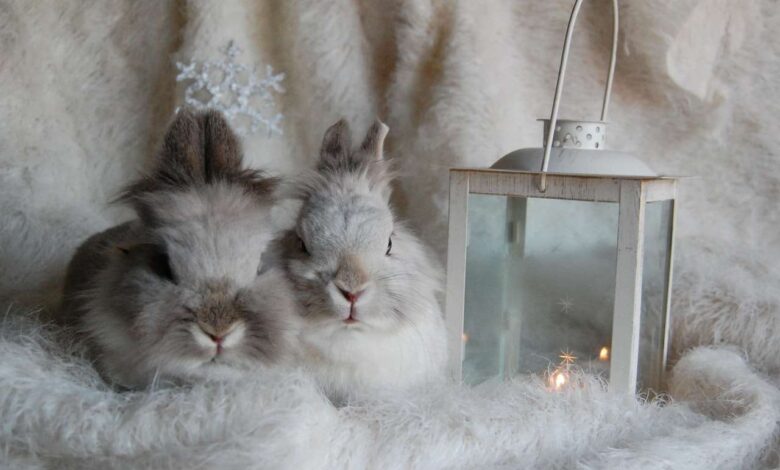Rabbit Health Problems: Causes, Symptoms, and Treatments

Rabbits, cherished for their affectionate nature and unique personalities, require diligent care and attention to maintain their well-being. Understanding the complexities of rabbit health problems is crucial for any responsible caregiver. From respiratory challenges to digestive issues and beyond, this in-depth guide aims to equip you with the knowledge needed to provide optimal care for your beloved furry friends.
Common Rabbit Health Problems
Respiratory Issues in Rabbits: Symptoms and Treatment
Respiratory problems, such as snuffles and pneumonia, can greatly affect a rabbit’s overall health and well-being. Common symptoms include sneezing, nasal discharge, and labored breathing. Swift identification and appropriate treatment, often including antibiotics and supportive care, are crucial in managing these conditions. Maintaining a clean and well-ventilated living environment, along with providing a balanced diet rich in essential nutrients, can aid in boosting a rabbit’s immunity and minimizing the risk of respiratory ailments.
Digestive Concerns: Identifying and Addressing Common Digestive Problems
Gastrointestinal stasis and diarrhea are common digestive issues in rabbits, often triggered by factors such as inappropriate diet or stress. Encouraging a diet high in fiber and ensuring access to clean water are fundamental in promoting healthy digestion. Close monitoring of fecal output and behavior is essential, with immediate veterinary consultation warranted for any irregularities. Proactive measures, including promoting regular exercise and minimizing stressors, play a vital role in preventing digestive complications.
Circulatory Complications in Rabbits: Warning Signs and Care Protocols
Circulatory problems, including heart disease and arterial blockages, can manifest through symptoms such as lethargy, weakness, and rapid breathing. Maintaining a suitable temperature and providing a stress-free environment are vital in promoting healthy circulation. Regular veterinary check-ups, combined with a well-balanced diet and appropriate exercise, contribute to overall cardiovascular health in rabbits.
Serious Rabbit Health Problems
Nervous System Disorders in Rabbits: Causes and Prognosis
Nervous system disorders, such as head tilt and encephalitozoon cuniculi, can significantly impact a rabbit’s quality of life. Causes may include infections and trauma, highlighting the importance of early intervention and supportive care. Creating a comfortable and stress-free environment, along with providing a nutritious diet, are essential in supporting the nervous system and alleviating potential complications.
Reproductive Health Problems: Understanding Challenges and Options
Female rabbits can face reproductive issues, including uterine cancer and pseudopregnancy, while males may encounter testicular tumors. Spaying or neutering rabbits can help prevent these issues and contribute to their overall well-being. Educating owners on the benefits of these procedures, alongside ensuring a safe and comfortable living environment, can significantly reduce the risk of reproductive health complications.
Dealing with Severe Skin Issues in Rabbits: Prevention and Treatment
Skin problems, such as fur mites and abscesses, can cause discomfort and potentially lead to more severe complications if left untreated. Regular grooming and thorough skin inspections are critical preventive measures. Maintaining a clean living space, ensuring proper nutrition, and promptly addressing any skin concerns through veterinary consultation contribute to a rabbit’s overall skin health.
Rabbit Injuries: First Aid and Preventive Measures
Handling Rabbit Injuries: A Guide to Immediate First Aid
Accidents can happen in the active lives of rabbits, and knowing how to provide immediate first aid for injuries, including cuts, wounds, or fractures, is crucial. Applying pressure to stop bleeding, cleaning wounds with gentle antiseptics, and creating a calm environment for the injured rabbit are primary steps in managing injuries before seeking veterinary care. Caretakers should also take preventive measures such as rabbit-proofing living spaces to minimize the risk of accidents.
Preventing Common Rabbit Injuries: Creating a Safe Environment
Establishing a safe and secure living environment is paramount in preventing injuries, such as falls, bites, or scratches. Removing potential hazards, providing adequate space for exercise, and using appropriate bedding are crucial preventive measures. Regular health checks, coupled with environmental modifications tailored to a rabbit’s specific needs, can significantly reduce the likelihood of injuries.
Rabbit Nutrition and Behavior Problems
Identifying and Solving Nutritional Imbalances in Rabbits
Nutritional imbalances can lead to various health issues, including dental problems and obesity. Offering a diet rich in hay, leafy greens, and controlled portions of pellets is vital for maintaining a healthy balance. Monitoring a rabbit’s eating habits, providing suitable chew toys for dental health, and consulting with a veterinarian for personalized dietary recommendations contribute to optimal nutrition and overall well-being.
Managing Behavioral Concerns: Strategies for a Healthy Rabbit Environment
Rabbits can exhibit behavioral issues, such as aggression or destructive behavior, stemming from stress or inadequate mental stimulation. Creating a stimulating environment with ample space for exercise, providing engaging toys, and establishing a consistent routine can help alleviate these issues. Additionally, spending quality time with your rabbit and understanding their individual needs are essential in promoting positive behavioral patterns.
Rabbit Poisoning: Symptoms and Emergency Response
Recognizing Signs of Poisoning in Rabbits: Swift Action Guidelines
Rabbits are susceptible to poisoning from ingesting toxic plants, pesticides, or other hazardous substances. Symptoms may include loss of appetite, lethargy, or convulsions. Identifying potential sources of poisoning and seeking immediate veterinary assistance are critical steps in managing this emergency. Providing a toxin-free living environment and carefully monitoring a rabbit’s access to potentially harmful substances are fundamental preventive measures.
Ensuring Rabbit Safety: Preventing Exposure to Toxic Substances
Preventing accidental poisoning involves meticulous monitoring of a rabbit’s living space, including both indoor and outdoor areas. Ensuring all plants within their reach are non-toxic, using safe cleaning products, and securely storing household chemicals are essential preventive measures. Educating all family members about potential hazards and maintaining a strict rabbit-proofing protocol contributes to the overall safety and well-being of the rabbit.
Rabbit Health Problems and Care: Holistic Approaches and Home Remedies
Exploring Natural Remedies for Rabbit Health Issues
Natural remedies, such as herbal supplements and homeopathic treatments, can complement traditional veterinary care in promoting rabbit health. Incorporating remedies like chamomile for digestive health or calendula for skin conditions, under the guidance of a knowledgeable veterinarian, can offer holistic support. Caretakers should also ensure a balanced diet, a stress-free environment, and regular exercise to maximize the benefits of natural remedies.
Integrating Holistic Treatments: A Comprehensive Care Approach
Holistic care emphasizes a comprehensive approach to a rabbit’s well-being, considering their physical, emotional, and environmental needs. Incorporating practices such as massage for relaxation, aromatherapy for stress reduction, and acupuncture for pain management can contribute to a rabbit’s overall health. Building a strong bond with your rabbit, providing ample mental stimulation, and creating a calm and nurturing living space form the foundation of a holistic approach to rabbit care.
Ensuring the health and happiness of rabbits requires a proactive approach that encompasses preventive measures, timely intervention, and a holistic understanding. With the insights provided in this guide, you can be better equipped to care for your cherished rabbit companion and promote








